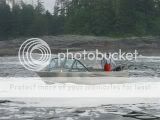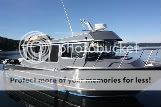quote:
Ethanol is a blend of gasoline and ethyl alcohol. Ethyl alcohol is an excellent solvent and is hydroscopic, that is it adsorbs water. Acting as a solvent, ethanol can damage the sealants used on older fiberglass fuel tanks. The dissolved sealants can be ingested by the engine which can cause damage and fuel leaking from a tank into the bilge is a fire hazard. Fuel tanks built of other materials are not immune to having a problem. Ethanol has a cleaning effect on tanks that releases fine metallic particles which will pass through most fuel filters. The dissolved metals will clog fuel injector nozzles and carburetors. Ethanol added to a fuel tank contaminated with water will cause expensive repairs. The water in the tank will combine with the ethyl alcohol to produce a noncombustible layer of liquid in the tanks that will stop most engines cold.
The jury is still out on the definitive protection plan for ethanol fuel use. The following are some suggestions that have helped other boaters:
•Boats built prior to 1984 should have their fiberglass fuel tanks and lines replaced with modern equivalents before ever using ethanol. This will immediately eliminate almost certain failure of these older fuel tanks and components.
•Historically boaters were told to leave their fuel tanks full in the winter. Initially the industry thought that it might be more prudent to empty the tanks and thoroughly clean them prior use in the following boating season. BoatU.S. is recommending that this practice not be followed.
•Use a good water separating fuel filter and carry several spare cartridges for it. Racor Filter manufactures a good product for this purpose.
•Try to avoid mixing gasoline blended with MBTE and ethanol. Use up the MBTE blended gasoline in your tank and insure the tank is clean prior to adding ethanol to it.
•Ethanol fuel has a very short shelf life compared to the gas we are used to burning. Limit your fuel onboard to what's needed in the next two weeks.
It appears the best defense for boaters in the use of ethanol fuel is to keep your fuel tank clean of water and use adequate filters. There may be more improvements in engine and fuel system technology that will address this problem. While your fueling your vessel, remember to review accepted industry Safe Boat Fueling practices.



